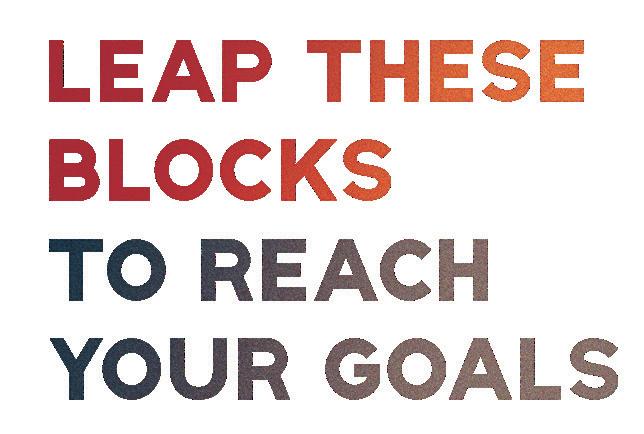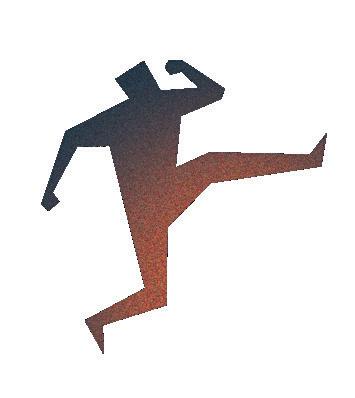
5 minute read
LEAP THESE BLOCKS TO REACH YOUR GOALS
By Annette Zapp NSCA CSCS and TSAC-F, FireSQfitness

Firefighters are a rare breed. We see things in black and white.
“This is how to start the saw.” “This is how to force a door.” And sometimes...
“This is how to eat and train (at least right now) until I white-knuckle my way through six weeks and then fall off the wagon spectacularly.”
That black and white mentality, along with our all-in or all-out attitudes and the wild extremes of effort we tend to expend are exactly what dooms most programs, diets and challenges to failure. So... What’s blocking you from reaching your goals?

PRESSING RESET
Pressing reset sounds like: “I need to decrease my body fat. There’s a laundry list of behaviors that will help me achieve that outcome, but instead of starting small and conquering one thing at a time, I’m going to do a reset! That’ll work like magic!”
Resets generally take the form of starvation diets, cleanses, overtraining boot-camps and other non-sustainable extremism. The thought process is that if you can survive the reset, you’ll somehow magically have integrated all the behaviours necessary to continue and ultimately reach your goal. Ah….no.
WAITING FOR MONDAY
This phenomenon occurs when someone knows they need to make a behavioral change but insists on waiting for Monday (or any other arbitrary deadline) to start the behavior. New Year’s resolutions are a great example of such thinking. It might work like this: “Wow, I feel awful when I don’t drink enough water. I really should drink more water. I’m going to drink more water…starting…Monday.”
Waiting for Monday to take action is a counterproductive waste of time. The smarter move is to identify the problem and start immediately with steps to make a change. It’s true that you can’t create change out of thin air, and sometimes a ramping-up stage is needed before you can implement a new habit.
If, for example, you need to plan and prep meals, go to the grocery store today and get easy ingredients you can use right away. Once you’re rolling, you can ramp up for the big food prep project.
Start now. Waiting for Monday or any other date will only put you on a relentless hamster wheel you’ll climb on and off forever. (Hello Monday, we meet again. Weren’t you here just last week?)
EXTREMISM
This kind of behavior is especially tantalizing for the firefighting population as it so intimately fits our personality profile. Think about it: the more extreme the emergency, the more exciting it is for the responder. Firefighters leave work to race cars, ride motorcycles, sky-dive and run adventure races. Why? We’re adrenaline junkies and we crave extremism! Why be moderate when we can live on the edge?
Extremism generally favors short-term solutions which are very strict and from the outset, unsustainable. Extremism takes the form of excessively low-calorie diets, the elimination of entire food groups, very high-intensity short-term programming (such as training for a body-building competition or marathon to control body composition) and multipleday fasting. Extremism means whiteknuckling your way through a painful and arduous process, making radical short-term changes that you already know won’t be sustainable. Swearing off alcohol, vowing to never pig out again and avoiding family gatherings are the mainstays of extremism. And so is wicked rebounding.
Extremism and resets can be similar, but in general, extremism is short-term while resets are even shorter. Neither addresses long-term, sustainable habits. And the bottom line? Neither work well.
FALLING OFF THE WAGON
Slip-ups will happen, even in long term programs. You intend to eat a chicken breast, some rice and a veggie, but somehow, you instead eat a whole pepperoni pizza. Falling off the wagon can turn a simple slip-up like an offplan meal or missed training session into six months of chaos.
Going off-plan successfully entails knowing and recognizing specific situations, such as vacations, for example, when sticking to your nutrition goals and training will be difficult or inconvenient. Know what lies ahead and plan accordingly. Firefighters can exhibit extreme personality traits both in their careers and in their health and wellness activities. If we can resist our natural inclinations and see how moderation and small changes executed consistently can help us avoid that same old hamster wheel patterning, we may find a whole new path.
HOW TO LEAP THOSE BLOCKS
You could go back to number one for another trip through the endless cycle or you could do something smart, sustainable and long-lasting.
• Small changes executed with discipline can yield big results, but this takes time and consistency. Giving up one soda per day but changing nothing else will eliminate between 100 and several hundred calories.
Adding an after-dinner walk will increase your daily caloric expenditure, as well as bolstering your parasympathetic nervous system. It may even help you become a better-functioning human being!
• Statistics prove that you’re more successful if you work on one behavior at a time rather than tackling several simultaneously. Choose a single, simple behavioral change and work on it consistently. When you’ve mastered it, move to another behavior.
• Making sustainable changes means altering your patterns. Simply saying, “I’m going to eat better” won’t work. What does “better” mean and how are you going to execute that plan? Committing to drinking 100 ounces of water (about 12 cups) each day is a solid behavioral objective. If you can respond with a “yes” or “no” to whether you executed the specific daily task needed to reach your goal, then you’ve set a good behavioral objective.
• Sustainable changes are behaviors you can execute for a lifetime, not just a few weeks.
• Start by looking at low-hanging fruit or big rocks to find behavioural change. Low-hanging fruit are simple goals that will yield easy wins, such as adding a serving of veggies to each meal or remembering to drink more water. Big rocks are large goals that require a lot of effort, but yield big benefits, such as joining a gym or hiring a coach to guide you through a wellness program.










